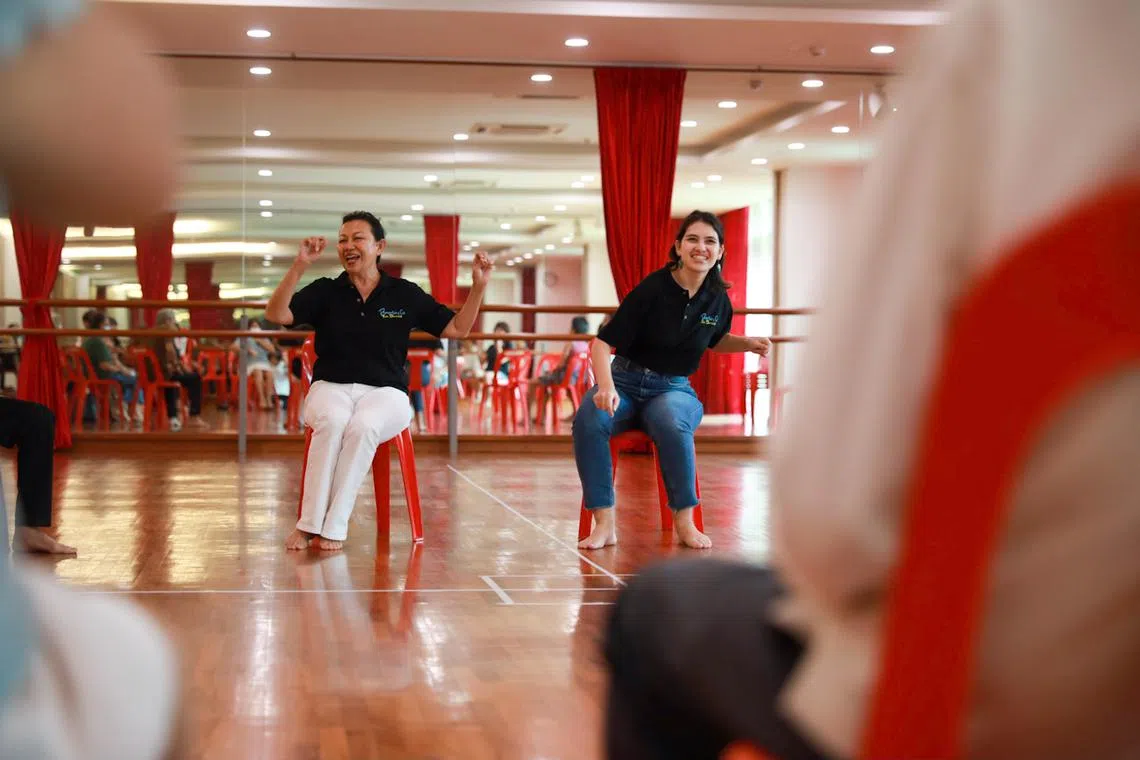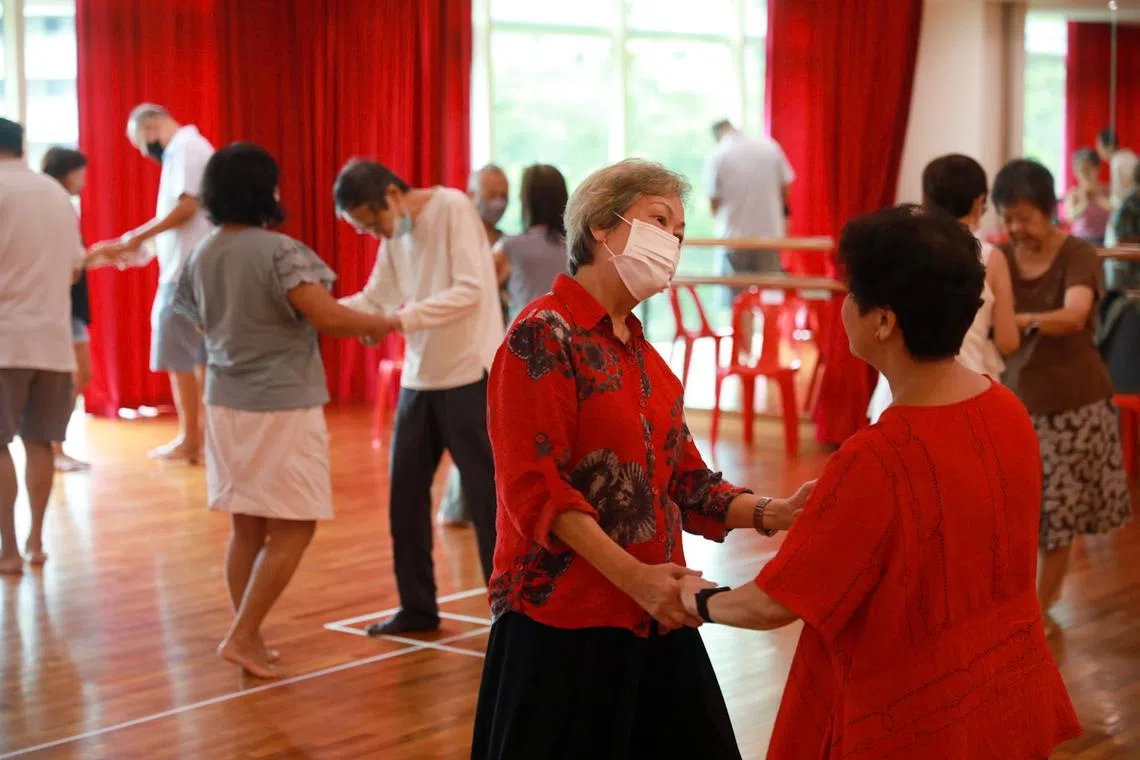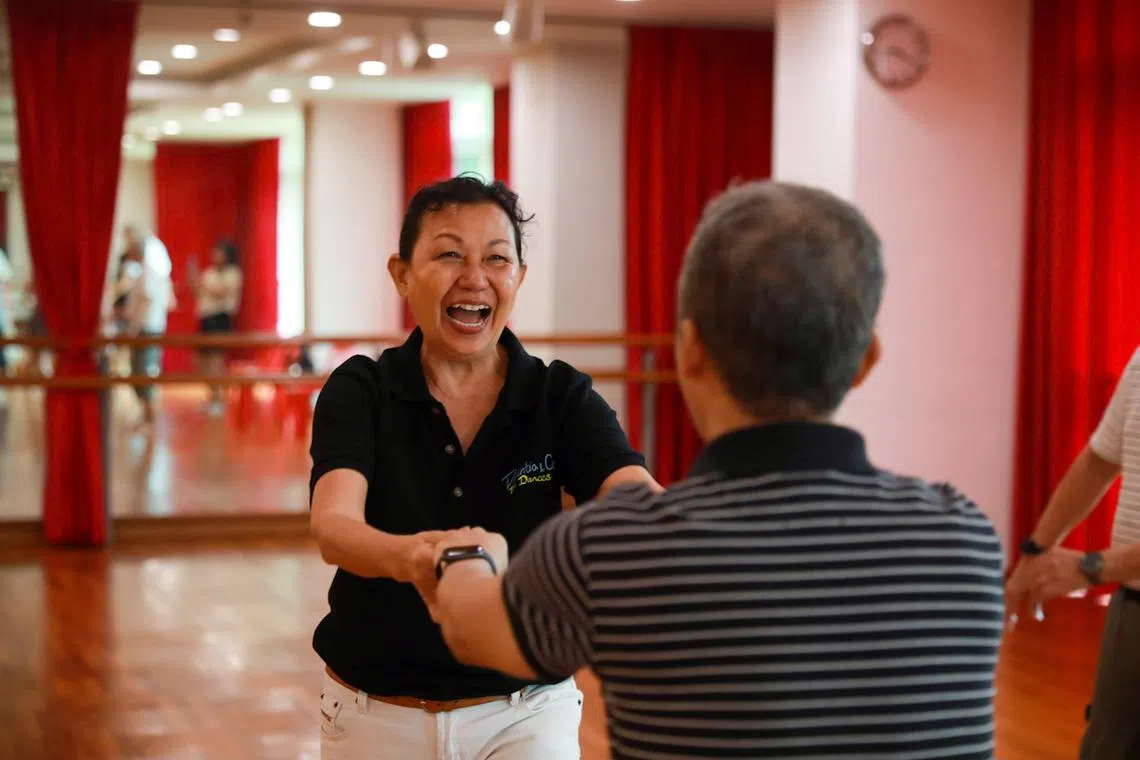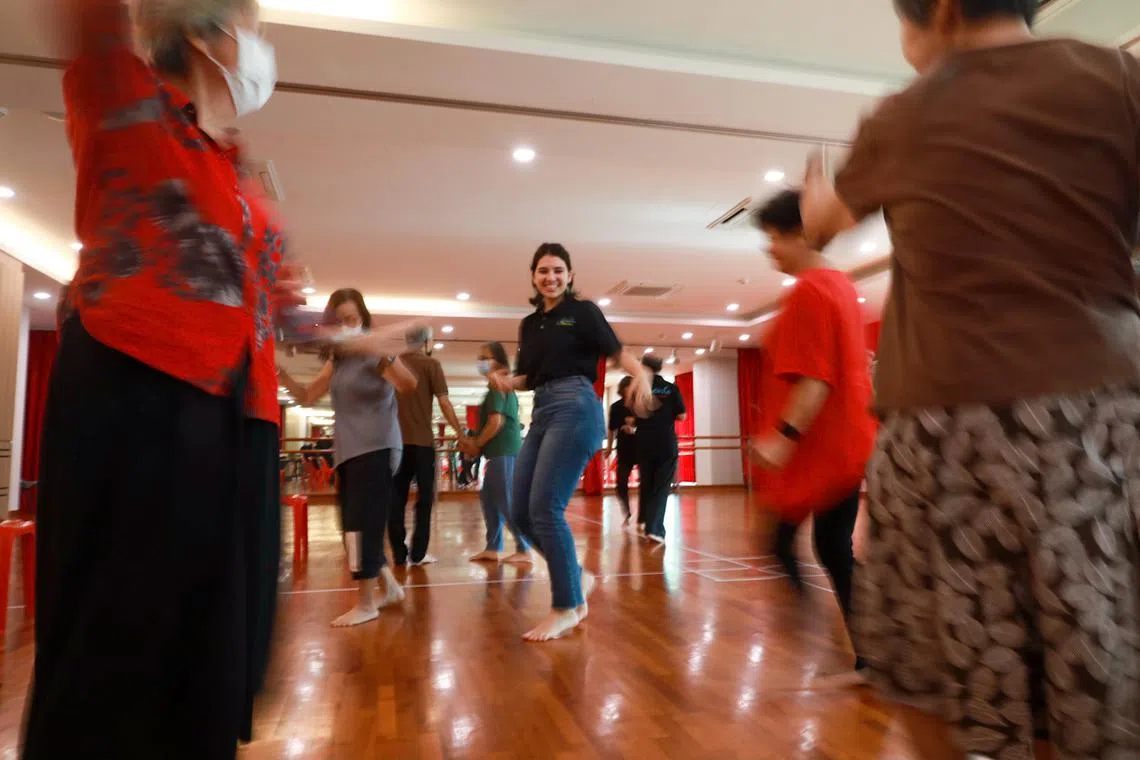Young onset dementia: Growing group faces financial, social challenges
Sign up now: Get ST's newsletters delivered to your inbox
SINGAPORE – Retired IT professional Dan Ridon had no idea what a tea dance was, or what it would be like to dance with about 15 strangers at the Kebun Baru Community Club.
Yet the usually “shy and quiet” 62-year-old, as his wife Sally described him, took to the dance like a fish to water, swaying to the latest pop hits.
“For sure I will come back again, why not?” he told The Straits Times at the end of the two-hour session.
It is hard to tell that Mr Ridon was diagnosed with young onset dementia (YOD) – in his case, post-hypoxic encephalopathy caused by lack of oxygen flow to his brain – after a heart attack in February 2020.
YOD is defined as a diagnosis of dementia below the age of 65 years.
Mrs Ridon, 62, retired from her job as administrative executive to be his full-time caregiver. He has lost his recent memory and displays occasional signs of irritation and confusion, she said.
The couple joined Dementia & Co, an organisation which runs activities for those living with dementia, at the recommendation of a daycare centre which thought Mr Ridon was too “young”. He was also not interested in their activities that were meant for older seniors.
Said Mrs Ridon: ”I read up about dementia on the Internet, but it’s nothing like the personal sharing from this support group to help us cope better.”
Dementia & Co was set up in 2016 by retired hotel industry consultant Alison Lim, 66, together with her daughter Jamie Lynn Buitelaar, a 26-year-old teacher.
Ms Lim was diagnosed seven years ago with a rare type of dementia – primary progressive aphasia, which affects her ability to communicate.
Unable to find support, she and Jamie set up the peer support group. They organise forums, tea parties, meals, gardening, art and cooking sessions at their home, as well as outings to places like museums and walks in parks.
The group has grown to over 100 families. Their tea dances have also expanded to four community clubs in Kebun Baru, Woodlands, Marsiling and Buangkok.

Ms Alison Lim, 66, and her daughter, Ms Jamie Lynn Buitelaar, 26, conducting a tea dance session with members of the Dementia & Co community at the Kebun Baru CC on May 8, 2023.
ST PHOTO: RYAN CHIONG
The mother and daughter team have a podcast called “Mum, Can We Talk?” and just kicked off a Dementia & Co YouTube channel and Spotify podcast, “Enjoying Living with Dementia”, featuring stories from people living with dementia and their care partners.
“It’s important to have a peer support group, and to reach out to those who have just been diagnosed and are feeling depressed,” Ms Lim said. “This is where they can clear the shame and fear, and learn to have some fun instead.”
Rise in young onset dementia
Over the past 10 years, the National Neuroscience Institute (NNI) at Tan Tock Seng Hospital (TTSH) has seen a steady increase in the number of newly diagnosed YOD cases. An estimated 30 per cent of patients seen at NNI for dementia have YOD, with the youngest person diagnosed being 40 years old.
In 2019, NNI saw 245 new cases of YOD, up from 60 in 2013.

Members of the Dementia & Co community at a tea dance session at the Kebun Baru CC on May 8, 2023.
ST PHOTO: RYAN CHIONG
From 2020 to 2021, the number of newly diagnosed YOD cases dipped during the Covid-19 pandemic, said Associate Professor Adeline Ng, senior consultant at NNI’s Department of Neurology.
But in 2022, the number of new cases returned to pre-pandemic levels, with more than 200 new cases recorded. Around 75 new cases of YOD were seen at NNI in the first quarter of 2023.
Prof Ng said the increase in YOD cases can be attributed to two key reasons.
First, there has been a greater awareness of YOD among the public and medical community.
Second, risk factors for certain types of dementia, such as vascular dementia, are also rising. These risk factors include high blood pressure and diabetes. If they are not controlled when an individual is in his or her middle age, it could significantly increase the risk of YOD.
Stroke survivors also have an increased risk of vascular dementia. The Singapore Stroke Registry Annual Report 2020 showed that there were 8,846 stroke cases in 2020, of which one in four people was aged 59 years and below.
It is possible that social isolation and the closure of rehabilitation and dementia care centres during the Covid-19 outbreak contributed to dementia progression in certain cases, said Prof Ng.
Symptoms of dementia are usually determined by the type of dementia a person has.
In later onset dementia diagnosed at 65 years and older, 61 per cent of cases are due to Alzheimer’s disease, and most patients have short-term memory loss.
Local data on YOD showed that only 35 per cent of cases are due to Alzheimer’s disease, and of these cases, about one-third do not present with short-term memory loss.
The remaining 65 per cent of YOD cases are due to other types of dementia such as vascular dementia, frontotemporal dementia, Parkinson disease dementia and Lewy Body Dementia.
These types of dementia usually show symptoms that affect behaviour and language rather than memory – for example, changes in personality such as getting very angry or aggressive when previously they were calm, loss of inhibition which results in them making inappropriate or insulting comments or actions like undressing in public.
They may also have difficulties with executive function, such as poor time management when they were previously organised. Some also struggle with language, such as finding the right word, spelling, reading or difficulty with understanding others.

Ms Alison Lim was diagnosed seven years ago with a rare dementia – primary progressive aphasia, which affects her ability to communicate.
ST PHOTO: RYAN CHIONG
Managing work difficulties, social isolation
Dementia Singapore’s director of care services Stephen Chan said those with YOD are usually still working, and may experience difficulties with work performance.
They may eventually switch to part-time work, or even quit their jobs completely. Beyond the financial strain on the family, this can take a mental and emotional toll on the person as they may experience feelings of guilt and even uselessness without a job to support their loved ones, he added.
Those with YOD may also have very different needs, wants and interests, compared with seniors with dementia, he said. But most dementia facilities, such as residential homes or daycare centres, are geared towards seniors.
Dementia Singapore, a dementia care social service agency, piloted the Young Onset Dementia Club in January 2022 to better address their unique needs. Ms Lim of Dementia & Co is an adviser and facilitator of the club.
It is important, said Mr Chan, for those with dementia to be socially connected and mentally stimulated again, now that the country has stepped down most of the remaining Covid-19 restrictions.
“The key to maintaining or improving the condition of a person with dementia is essentially consistency and a healthy routine,” he said.
Mr Chan added that some people with dementia may have isolated themselves from families or the community due to Covid-19 measures, which exacerbated the progression of their condition.
Take Madam Chin Chui Foong, for example. The 60-year-old was diagnosed with Alzheimer’s disease at age 55.
She used to be able to go out to buy her own food, but during the lockdown, the former laboratory manager lost that ability when she was confined at home, said her husband and caregiver Tay Shiang Lin.
As the doctor will see her only for yearly reviews, he decided to slow down her decline with acupuncture and Dementia & Co’s activities.
Said Mr Tay, a 59-year-old retired technical adviser: ”I have also learnt to be patient and let her do whatever she can, even if it is messy or takes a long time.
“Once she stops doing something, she loses the skill totally.”

Ms Jamie Lynn Buitelaar, 26, conducting a tea dance session with members of the Dementia & Co community at the Kebun Baru CC on May 8, 2023.
ST PHOTO: RYAN CHIONG
Early diagnosis and treatment is important
Those who are concerned that they have signs of dementia should consult their family doctor, and get a referral to see a dementia specialist for a more in-depth assessment if required.
Dementia tends to be diagnosed at a later stage in YOD as the symptoms can be vague, and the condition often progresses more rapidly in YOD than in later-onset dementia, said Prof Ng.
Some ways to manage YOD are the same as for later-onset dementia, including medication to help manage behavioural issues, behavioural and cognitive therapy, counselling for the patient and family members to help them come to terms with the diagnosis, caregiving training, and helping the person be socially engaged and mentally active.
To prevent or delay the progression of YOD, she advised seeking early diagnosis and treatment of risk factors such as high blood pressure, high cholesterol and diabetes.
Regular exercise, a healthy diet and adequate rest and sleep of at least seven hours a day are important, she said. One should also maintain an active social life and keep the brain active through work, games or learning new skills.
Ms Lim said: “Through my constant research on dementia, and by creating different programmes for and with my friends at Dementia & Co, I am able to keep active and stay positive. Dementia can happen to anyone, anytime. It is important to learn to live with the condition, find peer support and continue to enjoy life as far as possible.”


